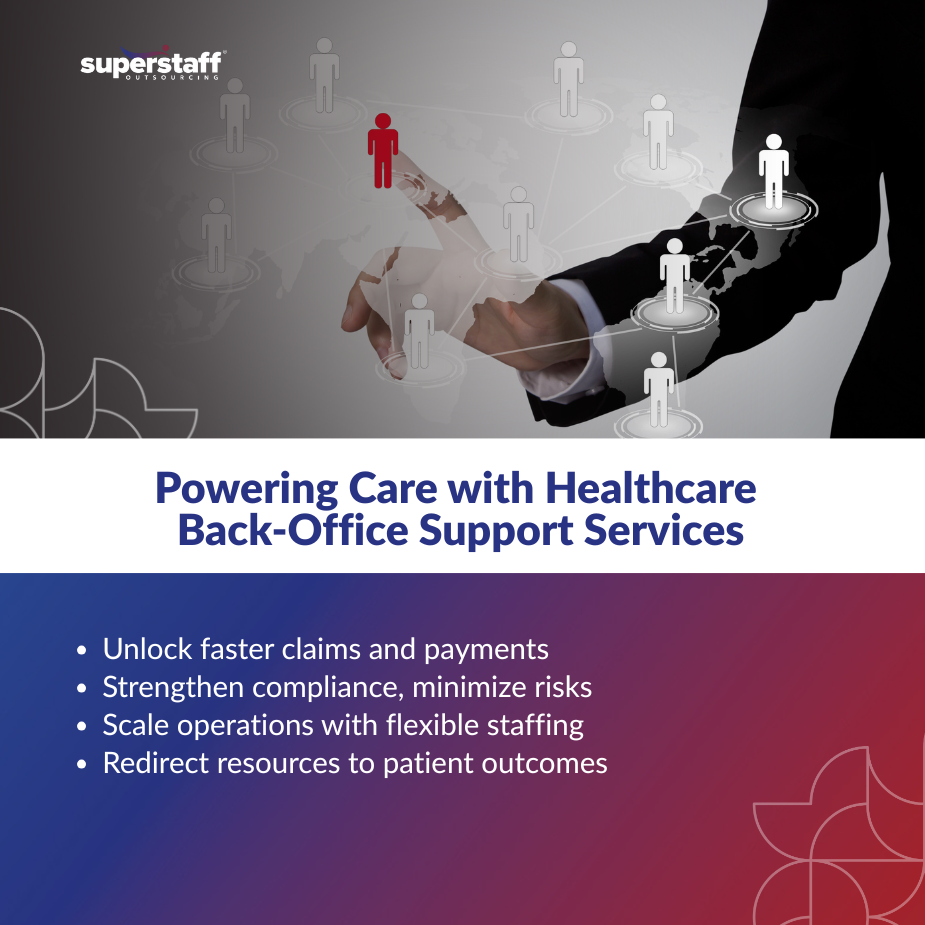
For many healthcare providers, the administrative side of the business feels just as demanding as the clinical one. The growing weight of billing, claims, and regulatory documentation not only drives up operational costs but also fuels staff burnout.
In a landscape where margins are tight and patient expectations are rising, inefficiencies in the back office ripple across the entire system. This is why healthcare back-office support services in the Philippines are now seen as more than a stopgap solution.
They represent a strategic lifeline, enabling U.S. healthcare providers to balance compliance, cut costs, and most importantly refocus their energy on patient care.
Rising Administrative Demands in Healthcare
Healthcare providers across the United States face a mounting wave of administrative responsibilities. Every patient interaction generates a trail of paperwork, from electronic health records and claims forms to compliance checklists and audit logs. Keeping pace with regulatory updates requires constant vigilance, and claims backlogs are a frequent bottleneck that delay reimbursements.
These burdens are not just operational headaches. They drive up overhead as practices and hospitals hire additional administrative staff, invest in complex systems, and struggle to maintain accuracy under pressure. Frontline providers often absorb the overflow, cutting into the time they could spend with patients.
For many, these inefficiencies contribute directly to professional fatigue, making the case for outsourcing more than a tactical fix. It is becoming a long-term strategy for survival, with healthcare back-office support services playing a central role.
Why the Philippines Stands Out
Over the past two decades, the Philippines has positioned itself as a global leader in healthcare outsourcing. For U.S. healthcare organizations weighing their options, the country offers a compelling mix of talent, infrastructure, and cultural alignment.
Healthcare outsourcing Philippines has flourished thanks to an education system that produces skilled professionals in nursing, medical technology, and other health-related fields. Many of these graduates transition into roles in medical back-office support, where they apply their expertise to billing, coding, and claims processes.
Their high English proficiency ensures clarity in documentation and communication, while a service-oriented culture naturally complements the needs of patient-centered industries.
Beyond the workforce, Philippine BPO providers have built a reputation for adhering to international compliance standards, particularly HIPAA. Strong data security protocols, investment in secure technologies, and established audit frameworks give healthcare organizations the confidence to entrust sensitive patient information to Philippine teams.
With decades of experience serving the global healthcare industry, the country is no longer an emerging player—it is an established hub for healthcare back-office support services.
Driving Operational Efficiency

The value of outsourcing lies in its ability to reduce friction across the entire administrative chain. By partnering with Philippine providers offering healthcare back-office support services, U.S. organizations can speed up claims processing cycles that would otherwise stall reimbursements. Fewer errors in medical coding and documentation reduce rejections, which translates to steadier cash flow and healthier revenue cycles.
Operational efficiency is not limited to paperwork. Scheduling, appointment reminders, and patient communications can all be streamlined by dedicated offshore teams. With fewer disruptions, frontline staff work with greater confidence, while managers gain clearer oversight of performance.
Every hour saved in the back office translates to additional hours that can be redirected toward delivering quality care. Healthcare back-office support services ensure these improvements are consistent and sustainable over time.
The Cost-Effectiveness Factor
One of the most compelling reasons to explore healthcare outsourcing Philippines is cost. Hiring and training in-house administrative teams in the U.S. is a significant expense, compounded by high turnover and rising wages. By contrast, outsourcing to the Philippines delivers access to equally skilled professionals at a fraction of the cost.
The savings are not simply pocketed but reinvested where they matter most—into frontline patient services, new technologies, and expanded care programs. Outsourcing also allows for flexible staffing models. Providers can scale teams up or down based on patient volume, seasonal surges, or regulatory demands without the financial strain of maintaining full-time employees.
This flexibility, combined with cost advantages, ensures that healthcare organizations remain competitive without compromising quality. When paired with healthcare back-office support services, these savings translate into even greater organizational strength.
Enhancing Compliance and Data Security
Healthcare is one of the most highly regulated industries in the world. Compliance failures can result in heavy penalties and erode patient trust. Philippine outsourcing providers understand this reality and have built robust compliance frameworks to safeguard clients.
From strict HIPAA adherence to GDPR compliance for organizations with international reach, Philippine BPOs integrate data protection into every process. Secure cloud platforms, encrypted communication channels, and detailed audit trails are standard features. Teams dedicated to compliance continuously monitor regulatory updates, ensuring providers are never blindsided by changes in requirements.
The reassurance that comes from outsourcing compliance-heavy tasks to seasoned partners cannot be overstated. For decision-makers, this means reduced risk and greater confidence in the integrity of their operations. For many organizations, this confidence is achieved through healthcare back-office support services delivered by Philippine teams.
Refocusing on Patient Care
Perhaps the most meaningful benefit of outsourcing is its impact on patient care. When healthcare providers offload administrative burdens, nurses and doctors regain precious time with patients. This leads to higher job satisfaction, reduced burnout, and a noticeable improvement in morale.
Patients benefit too. With providers less distracted by paperwork, interactions become more focused and empathetic. Reduced wait times, clearer billing, and better follow-up all stem from the efficiencies created in the back office. By handling administrative responsibilities externally, healthcare back-office support services indirectly elevate the patient experience within the clinic.
Leveraging Technology for Smarter Operations
The outsourcing industry in the Philippines is not limited to human expertise. Providers increasingly rely on advanced technologies to strengthen their services. Electronic health record management is streamlined with secure digital platforms, ensuring data is updated in real time. AI-powered claims automation reduces errors, while predictive analytics provide actionable insights into patient trends and operational bottlenecks.
By outsourcing to teams that combine skilled professionals with cutting-edge tools, healthcare providers gain access to innovations that might otherwise be cost-prohibitive. These advancements are not just about efficiency—they represent the future of healthcare administration, where accuracy, speed, and adaptability are non-negotiable. Healthcare back-office support services that integrate these technologies are the backbone of tomorrow’s efficient healthcare systems.
Real-World Impact
The theory behind outsourcing is well understood, but the real-world results are even more compelling. Providers who turned to Philippine outsourcing have seen reductions in claim rejections and improved turnaround times on reimbursements. Hospitals that relied on offshore billing support shortened their revenue cycles, while smaller clinics redirected cost savings into expanding patient programs.
These outcomes illustrate a clear truth: outsourcing is not just about cutting costs. It creates measurable improvements that ripple across financial performance, patient satisfaction, and organizational resilience.
The decision to outsource is often sparked by necessity, but the long-term benefits far exceed initial expectations. With healthcare back-office support services, these improvements become the rule rather than the exception.
Building Resilience Through Outsourcing
If the recent pandemic revealed anything, it was the fragility of healthcare systems under strain. Staffing shortages, surging patient demand, and supply chain disruptions left many providers scrambling to maintain continuity. Outsourcing proved to be a stabilizing force during this period, providing scalable support when internal teams were stretched too thin.
Healthcare organizations that embraced outsourcing not only weathered the crisis more effectively but also emerged stronger. They now view outsourcing not simply as a backup but as a built-in component of their resilience strategy.
Access to a steady pipeline of skilled talent in the Philippines ensures that operations remain consistent even when local challenges arise. This resilience is critical for sustainable healthcare delivery in an unpredictable world, and healthcare back-office support services remain at the heart of this stability.
The Role of the Right Partner
Not all outsourcing providers are created equal. For healthcare organizations, choosing the right partner is crucial. An experienced Philippine BPO brings proven expertise in medical processes, transparent service-level agreements, and a human-centered approach that respects the sensitive nature of healthcare.
Partnerships that emphasize collaboration, continuous improvement, and cultural alignment create more than cost savings—they create long-term strategic value. With the right partner, outsourcing transitions from a transactional relationship to a shared mission of improving patient outcomes. Healthcare back-office support services succeed best when guided by a partner that understands the unique challenges of the healthcare sector.
Healthcare Back-Office Support Services as a Strategic Imperative
It is clear that healthcare back-office support services in the Philippines are no longer optional—they are essential for organizations that want to stay efficient, compliant, and patient-centered. From driving cost savings and improving compliance to empowering frontline staff and enhancing resilience, outsourcing delivers value at every level of the healthcare system.
For decision-makers asking “why outsource healthcare back-office operations,” the evidence points to a single conclusion: the advantages are clear, practical, and measurable. By partnering with an experienced provider like SuperStaff, healthcare organizations can transform back-office operations from a source of strain into a driver of excellence.
SuperStaff’s healthcare outsourcing solutions are built on expertise, compliance, and a commitment to people. Partner with us today and unlock the efficiency, accuracy, and care your patients and your business deserve.






